
CHRISTIANITY: The religion based on the person and teachings of Jesus Christ, or its beliefs and practices.
To understand Christianity, we need to know who the characters depicted in the Bible were, who the authors were, and why some texts were chosen over others for inclusion. Most of these facts are not well known by most Christians, yet some are discussed on this site and all these questions are fully answered in my book
I discuss:
Why the historical character Jesus may have existed, yet the man described in the Gospels is hardly a true depiction of him.
Why St. Paul, the creator of Christian theology, was, in fact, a charlatan with no bona fide credentials.
Why the New Testament is not the word of God, and how it could well have been Roman Government propaganda used to control the common people’s behaviour.
How propaganda originating from the Bible is still being used for political purposes, and is damaging people’s psychological health.
The fact that children’s heads are being filled with superstitious Christian nonsense is immoral.
Knowledge empowers people, and the truth always creeps in through the cracks. Everyone deserves the chance to discover truth.
I honestly believe the facts revealed in my book allow people to “get over Christianity by understanding it.”
If you are someone who has been exposed to much Christian proselytising, yet your own common sense has prevented you from getting entrenched in a church, my book will most definitely legitimise your doubts.
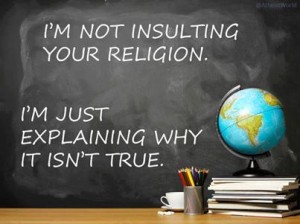

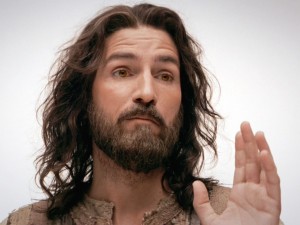
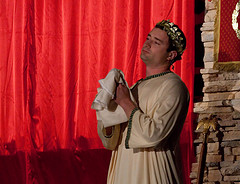

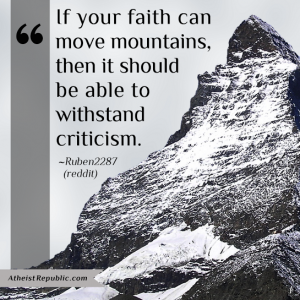



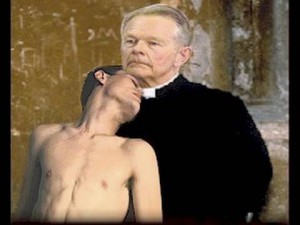
GET OVER CHRISTIANITY – Book Overview
Mark Fulton’s book “Get over Christianity by Understanding it” questions the origins of Christianity through an exploration of who the Biblical players were, and the authors’ motives.
The book reveals many obscure facts, and exposes a large number of fictions for what they are. The book’s conclusions are based on assessments of primary sources such as the Bible itself, as well as the opinions of numerous respected historians, and are the product of many years of exhaustive investigation.
The book concludes that the Old Testament is largely fabricated, is profoundly immoral, and has been the primary cause of much human suffering and ideological baggage.
Fulton thinks that Jesus may have existed; yet that the man described in the Gospels is not a true depiction.
He thinks Jesus was probably a fundamentalist Jewish zealot, and not a Christian, and that Jesus had no delusions that he was the Son of God, and no wish to die for humanity’s sins. Instead, Fulton has Jesus as a hopeful Jewish messiah who tried to start a war with the Roman garrison in Jerusalem, yet was outmanoeuvred and crucified before his ambitions had a chance to come to fruition.
Decades after Jesus’ death, the Roman government may have used the memory of Jesus the zealot to help create a new god, the Christ. Jesus was depicted, paradoxically, as a benign passive preacher and a willing taxpayer. Fulton considers the New Testament not as the Word of God, but as Roman government propaganda.
Fulton thinks that religion then, as now, was used for political purposes, and that the government created Christianity to control trouble-causing Jews by claiming their Messiah had already been and gone. The book portrays Saint Paul, the real originator of Christian theology, as a paid government employee and an over imaginative charlatan.
The book reveals why the Vatican’s story of a Pope Peter in Rome is a crass fiction.Fulton postulates that in the fourth century, when militant Jews were no longer a threat, the Roman government under Constantine realised that Christianity, with its ecclesiastical hierarchy, could prove a useful ally when it came to crowd control.
He discusses how many different stories about Jesus were discarded, and others stitched together, to create a god suitable for common consumption. A population united and ruled over by one god and obedient to the government was attractive to an administration trying to keep order. Jesus replaced a horde of other gods to become the only government-approved deity in the empire, and Fulton thinks this was how Christianity formed such a firm foothold in the wider world.
One of the most innovative and valuable aspects of the book is the hundreds of free links, accessed with a click of a button, to documents, webpages and documentaries. To give you an idea of the topics covered, here is a list of the book’s contents.
(Did you buy the book? Download the MEDIA LINKS here)
GET OVER CHRISTIANITY by UNDERSTANDING IT
| BOOK CONTENTS | ||
| Foreword | XIII | |
| Introduction | XV | |
| Road Map of this Book | XXI | |
| SECTION 1 | THE HISTORY | |
| Chapter 1 | The Jews, from Abraham to Yeshua (Jesus) | 1 |
| Abraham and Moses. | ||
| The Tribal Confederation. | ||
| Samuel and Saul. | ||
| David. | ||
| Solomon. | ||
| Rehoboam and Jeroboam. | ||
| The Babylonian Exile. | ||
| The Documentary Hypothesis. | ||
| After the Babylonian Exile. | ||
| The Greeks. | ||
| The Maccabees. | ||
| The Romans. | ||
| Summary. | ||
| Chapter 2 | Yeshua (Jesus) | 33 |
| Did Yeshua Exist? | ||
| Yeshua’s’ Infancy. | ||
| Jesus’ Early Life. | ||
| Yeshua’s Brothers and Sisters. | ||
| Yeshua and Judaism. | ||
| The Political Climate in Palestine and Galilee. | ||
| The Structure of Jewish Society. | ||
| Sadducees. | ||
| Scribes. | ||
| Pharisees. | ||
| Essenes. | ||
| Was Yeshua an Essene? | ||
| Zealots. | ||
| The Nazarenes. | ||
| Yeshua the Young Man. | ||
| Yeshua the Zealot. | ||
| Brothers in Arms…John and Yeshua. | ||
| Yeshua takes over the Leadership. | ||
| Yeshua Enters Jerusalem. | ||
| Yeshua is Arrested. | ||
| The Trial. | ||
| The Crucifixion. | ||
| After the Crucifixion. | ||
| Summary of Yeshua’s life. | ||
| The Christian Jesus is a Concocted Myth! | ||
| Chapter 3 | James, Jesus’ Brother | 103 |
| Chapter 4 | Saint Paul | 111 |
| Paul’s Early Life. | ||
| Paul’s Early Opposition to the Followers of Jesus. | ||
| Paul’s Fictional Epiphany. | ||
| The First Christian Author. | ||
| Paul Knew Almost Nothing of Jesus! | ||
| Paul’s Theology. | ||
| The Source of Paul’s Theology. | ||
| Christ’s Sacrificial Death. | ||
| Sin. | ||
| Salvation. | ||
| The Second Coming of Christ. | ||
| Paul the Salesman. | ||
| Paul’s Relationship with the Nazarenes. | ||
| Paul the Cult Leader. | ||
| Chapter 5 | Palestine 62-70 CE | 157 |
| James’ Death. | ||
| The Jews Gain Control of Jerusalem. | ||
| The Kingdom of God? | ||
| A Disaster for Jews and Judaism | ||
| Chapter 6 | Jews, Romans and the Birth of Christianity | 171 |
| “Jesus” has been made “pro-Gentile.” | ||
| Was Christianity a Product of the Roman Government? | ||
| Chapter 7 | First Century Christianity | 185 |
| The books of Peter and John. | ||
| The book of Revelations. | ||
| Clement. | ||
| Ignatius. | ||
| Chapter 8 | Second Century Christianity | 197 |
| Polycarp. | ||
| Papias. | ||
| Mid Second Century Rome. | ||
| Marcion. | ||
| Valentinus. | ||
| Valentinus and Gnosticism. | ||
| Justin Martyr. | ||
| Irenaeus. | ||
| The Catholic Church Invents Peter’s Papacy. | ||
| The Gospels and Paul’s Writings. | ||
| Chapter 9 | Third Century Christianity. | 243 |
| Tertullian. | ||
| Origen. | ||
| Chapter 10 | Fourth Century Christianity. | 251 |
| Eusebius. | ||
| Ambrose. | ||
| Jerome. | ||
| Augustine. | ||
| Chapter 11 | How the Bible was Compiled | 267 |
| The Old Testament. | ||
| The New Testament. | ||
| First Century. | ||
| Second Century. | ||
| Third Century. | ||
| Fourth Century. | ||
| Some Conclusions. | ||
| Chapter 12 | What Happened to the Nazarenes? | 301 |
| Chapter 13 | Mithraism and other Contemporary Cults | 313 |
| Mithraism. | ||
| Other Cults and their Contribution to Christian Mythology. | ||
| SECTION 2 | THE CONTENT OF THE BIBLE | |
| Chapter 14 | The Old Testament | 327 |
| The Canon of the Old Testament. | ||
| What is in the Old Testament? | ||
| The Ten Commandments. | ||
| Murder. | ||
| Infanticide. | ||
| Homosexuality. | ||
| Rape and Pedophilia. | ||
| Sexism. | ||
| Human Sacrifice. | ||
| Slavery. | ||
| Witches. | ||
| Atheists. | ||
| God’s Rules. | ||
| Yahweh was a Thug. | ||
| An Emotional God? | ||
| An Exclusive and Powerful God. | ||
| Explanations of Natural Phenomena. | ||
| The Creation Fable. | ||
| Other Myths in the Old Testament. | ||
| God does not Exist. | ||
| Heaven and Hell. | ||
| The Foundation of Christianity. | ||
| Did the Old Testament Predict Jesus? | ||
| Summing Up. | ||
| Chapter 15 | The Gospels | 381 |
| Did Eyewitnesses write the Gospels? | ||
| Mark, Matthew, Luke, and John. | ||
| Lost in Translation. | ||
| Yeshua’s Words? | ||
| Why Were the Gospels Written? | ||
| Four Inconsistent Stories. | ||
| Paternity Issues. | ||
| The Virgin Mary. | ||
| Mary’s Perpetual Virginity. | ||
| Was Jesus a Miracle Worker? | ||
| Second Hand Instructions. | ||
| Jesus’ Teachings. | ||
| Intolerance. | ||
| Xenophobia. | ||
| Threats of Hell. | ||
| In Praise of Poverty. | ||
| Misery. | ||
| Patronization. | ||
| Ignorance. | ||
| Inconsistency. | ||
| Forgiveness? | ||
| Sexual Guilt. | ||
| Lack of balance. | ||
| Pacifism. | ||
| Sacrifice. | ||
| Salvation. | ||
| Faith. | ||
| The Family Unit. | ||
| Poorly Explained Dogma. | ||
| Jesus’ Admirable Teachings. | ||
| He was No Philosopher. | ||
| The Mind of an Omniscient God. | ||
| Jesus’ Resurrection. | ||
| Atwill’s Theory. | ||
| In Summary. | ||
| Today’s Churches Have Reinvented Jesus. | ||
| “Getting Back to Jesus.” | ||
| Chapter 16 | Saint Paul’s Letters | 479 |
| Paul’s Ethics. | ||
| Paul the Misogynist. | ||
| Paul the Homophobe. | ||
| Paul’s Views on Sex and Marriage. | ||
| Paul the Totalitarian | ||
| Paul Supported Slavery. | ||
| Paul the Anti-Semite. | ||
| The Last Supper. | ||
| A Complex Character. | ||
| Summary of Paul. | ||
| Chapter 17 | The Book of Acts | 503 |
| Stephen. | ||
| Paul in Jerusalem. | ||
| Paul’s Travels. | ||
| Summary of Acts | ||
| Chapter 18 | James’ Letter (The Epistle of James) | 525 |
| Chapter 19 | The Q Document and the Gospel of Thomas and the Apocalypse of Peter | 531 |
| The Q Document. | ||
| The Gospel of Thomas. | ||
| The Apocalypse of Peter | ||
| Chapter 20 | Conclusions about the Bible | 539 |
| Backward Thinking and Divisiveness. | ||
| The Bible is a Confusing Book. | ||
| Which Bible? | ||
| Christians Cherry-Pick the Bible. | ||
| Isn’t the Truth Important? | ||
| Author Bias? | ||
| SECTION 3 | CHRISTIANITY TODAY | |
| Chapter 21 | God and Heaven in Context | 551 |
| Chapter 22 | Churches | 559 |
| A Shameful History. | ||
| Ignorance and Dishonesty. | ||
| Power and Money. | ||
| Bigotry in Churches. | ||
| Churches and Children. | ||
| Marketing to Adults. | ||
| Chapter 23 | The Vatican | 573 |
| Money Money Money. | ||
| Apostolic Succession? | ||
| More Lies…Peter’s Bones. | ||
| Sexual Abuse of Children by Employees of the Catholic Church. | ||
| A Poor Track Record on Ethical Issues. | ||
| A Message to the Vatican | ||
| Chapter 24 | The Psychological and Social Damage | 615 |
| Suppression. | ||
| Greed and Hypocrisy. | ||
| The Psychological Effects. | ||
| Poor Self-Esteem. | ||
| Thought and Emotion Suppression. | ||
| Reliance on Faith. | ||
| Children and the Burden of Shame. | ||
| Pretence. | ||
| Fear of hell. | ||
| Cognitive Dissonance. | ||
| Power in families. | ||
| Physical, Emotional and Sexual Abuse. | ||
| Lack of Critical Thinking. | ||
| Sexuality. | ||
| Religion Replacing Love. | ||
| Intolerance. | ||
| Uncertainty. | ||
| Complacency. | ||
| “Unchristian” Emotions. | ||
| Benefits? | ||
| The Cost of Christianity to Society. | ||
| Chapter 25 | Towards a Better World | 647 |
| Chapter 26 | Intuition | 655 |
| Afterword | ||
| Thank you and Goodbye | 663 |
Have you purchased the paperback version of the book? Would you like to access the links?
Hallo, and thank you for visiting my website. This website, and my book, are not about me, but you may like to know a little about the author. Allow me to share my history with you…
I was born in Hobart, Tasmania, Australia. My parents were practicing Catholics, and my uncle was a Catholic priest.
I attended Catholic schools during my formative years. As a child and young man I never felt comfortable with Christian teaching, as I considered much of it inherently implausible. Like millions of others I suffered through religious instruction and church services, but I did not have the maturity, or inclination, or time to seriously question the dogma. I now regret the waste of countless hours lost in Christian indoctrination during my youth. I would have much preferred to have studied history instead. The day I left home as a sixteen year old I stopped going to church. I had had enough of being told what to believe and how to behave.
I obtained a medical degree, and am now a practicing doctor on the Sunshine Coast in Queensland, Australia. I own a practice with a particular interest in preventative medicine. I have a holistic approach to my patients, and try to help people achieve not only good health, but also happiness.
Some years ago I began to notice that many of my Christian patients had significant psychological issues, and I wondered to what degree their Christian beliefs were responsible for their problems. I knew that many political issues, too, had their roots in Christian beliefs. The time was right to make a serious study of the religion I was born into.
I wanted to discover the essence of Christianity, and spent nearly all my spare time in the next seven years studying early Christian history, with a particular emphasis on the Bible. The more I learned, the more intriguing the puzzle became.
After many years I arrived at some firm conclusions. I thought them worth sharing, so wrote them down. The result is my first book, from which the posts on this website are taken. My conclusions are a product of over seven years of intensive thought and investigation.
I write in a colloquial, rather than formal style, and not as a Biblical scholar, but as a layman, which I hope in some ways adds appeal to the writing. I am not a qualified academic, although many of my sources are. Some of my views are partly based on my own professional experience. What is revealed in my book may be life changing for some people.
I hope this website, and particularly my book, will appeal to everyone who enjoys history and informed opinions about the Bible and Christianity.
Happy reading, Mark